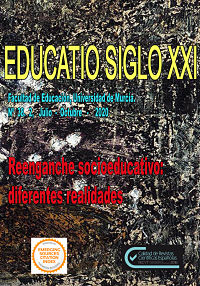Young people insights on their participation in educational measures in Northern Portugal: Between challenges and opportunities
Abstract
This article explores the participation of young citizens in educational contexts when almost twenty years have passed since the European Union recognized them as a social group different from children. Young people are now considered to have specificities and rights as European citizens, with a crucial role in the building of Europe. This article argues in favor of the exertion of educational citizenship by young people. Within this framework, young men and women were enquired on the reasons for their participation in an educational intervention measure, in a school, and a compensation measure in a training center, with a view to addressing early school leaving. Biographical interviews were conducted in two distinct longitudinal phases. The measures were designed along the educational lines defined by Europe. The research was carried out within the framework of the international RESL.eu project, in four very different institutions. The school which took part in the research included teaching from kindergarten through to Grade 12, in an area of priority educational intervention covered by the national TEIP program. The training center had to do with the field of wood and furniture. Both institutions are located in the North of Portugal, in an urban and an industrial area, respectively.
Downloads
-
Abstract582
-
PDF (Español (España))447
References
Arnot, M. (2006). Gender voices in the classroom. In C. Skelton, B. Francis, & L. Smulyan (Eds.), The Sage handbook of gender and education (pp. 407-421). London: Sage.
Bernstein, B. (1996). Pedagogy, symbolic control and identity: Theory, research and critique. Bristol: Taylor & Francis.
Bernstein, Basil (2003). Class, codes and control: Theoretical studies towards a sociology of language. London: Routledge.
European Commission (2001). White paper a new impetus for European youth. Recuperado de http://ec.europa.eu/youth/archive/whitepaper/download/whitepaper_en.pdf
European Commission/EACEA/Eurydice/Cedefop - COM (2014). Tackling early leaving from education and training in Europe: Strategies, policies and measures.Eurydice and Cedefop report. Luxembourg: Publications Office of the European Union. doi:10.2797/75048
Flutter, J., &Rudduck, J. (2004). Consulting pupils: What’s in it for schools?London & New York: RoutledgeFalmer.
Freire, P. (1981). Pedagogia do oprimido. Rio de Janeiro: Paz e Terra.
Fullan, M. (1991). The new meaning of educational change. Toronto: Teachers College Press.
Hart, R. (1992). Children’s participation: From tokenism to citizenship. Florence: UNICEF International Child Development Centre.
Hart, R. (1997). Children’s participation: The theory and practice of involving young citizens in community development and environmental care. London: Earthscan Publications.
Heath, S., Brooks, R., Cleaver, E., & Ireland, E. (2009). Researching young people’s lives. London: Sage.
Kirby, P., Lanyon, C., Cronin, K., & Sinclair, R. (2003). Building a culture of participation. London: Department for Education and Skills, National Children’s Bureau.
Lister, R. (1997). Citizenship: Feminist perspectives. New York: New York University Press.
Lister, R. (2007). Inclusive citizenship: Realizing the potential. Citizenship Studies, 11(1), 49-61. doi:10.1080/13621020601099856
Lynch, K., & Lodge, A. (2002). Equality and power in schools. London and New York: RoutledgeFalmer.
MacBeath, J. (1999). Schools must speak for themselves: The case for school self-evaluation. London: Routledge.
MacBeath, J., Demetriou, H., Rudduck, J., & Myers, K. (2003). Consulting pupils: A toolkit for teachers.Cambridge: Pearsons.
Macedo, E. (2018). Vozes jovens entre experiência e desejo: Cidadania educacional e outras construções. Porto: Afrontamento.
Macedo, E., & Araújo, H. C. (2014). Young Portuguese construction of educational citizenship: Commitments and conflicts in semi-disadvantaged secondary schools.Journal of Youth Studies, 17(3), 343-359. doi:10.1080/13676261.2013.825707.
Macedo, E., Araújo, H. C., Magalhães, A., & Rocha, C. (2015). La construcción del abandono temprano de la escuela como concepto político: Un análisis en la sociología de la educación. Profesorado: Revista de Curriculum y Formación del Profesorado, 19(3). Recuperado de https://recyt.fecyt.es/index.php/profesorado/article/view/43621
Nada, C., Santos, S. A., Macedo, E., & Araújo, H. C. (2018). Can mainstream and alternative education learn from each other? An analysis of measures against school dropout and early school leaving in Portugal. EducationalReview, 1-21. doi:10.1080/00131911.2018.1508127
Organización para la Cooperación y el Desarrollo Económico - OECD (2014). OECD indicators. Recuperado de http://www.oecd.org/edu/Education-at-a-Glance-2014.pdf
Organización para la Cooperación y el Desarrollo Económico - OECD (2018). Education at a glance 2018. Recuperado de https://www.oecd-ilibrary.org/education/education-at-a-glance-2018_eag-2018-en
Rudduck, J., Chaplain, R., & Wallace, G. (1996). School improvement: What can pupils tell us?London: Fulton.
UNICEF (Fondo de las Naciones Unidas para la Infancia)(2006). Convención sobre los derechos del niño. Recuperado de https://www.un.org/es/events/childrenday/pdf/derechos.pdf
UNICEF (Fondo de las Naciones Unidas para la Infancia)(s.d.). How we protect children's rights with the UN Convention on the Rights of the Child [website]. Recuperado de https://www.unicef.org.uk/what-we-do/un-convention-child-rights/
Young, I. (2000). Inclusion and democracy. Oxford: University Press.
Copyright (c) 2020 Servicio de Publicaciones de la Universidad de Murcia

This work is licensed under a Creative Commons Attribution-NonCommercial-NoDerivatives 4.0 International License.
Original work publishes in this journal is subject to the following terms:
1. Murcia University Press (the publishing house) holds the copyright of the publishes work, and favours and allows their reutilization under the use license stated in point 2.
© Servicio de Publicaciones, Universidad de Murcia, 2015
2. Work is published in the electronic edition under a license (Creative Commons Reconocimiento-NoComercial-SinObraDerivada 4.0 España (legal text). They can be copied, used, disseminated, transmitted and publicly presented, as long as: i) authorship and original publication source is acknowledged (journal, publishing house and URL of the work); ii) are not used for commercial purposes; iii) the existence and specifications of this use license is stated.
3. Conditions for self-archive. Authors are allowed and encouraged to disseminate electronically the pre-pint (before review) and/or post-print (accepted for publication) versions of their work before their publication since that favours earlier circulation and dissemination resulting in an increased chance for the authors to be cited and for the work to reach a bigger share of the academic community. Colour: RoMEO: green.








